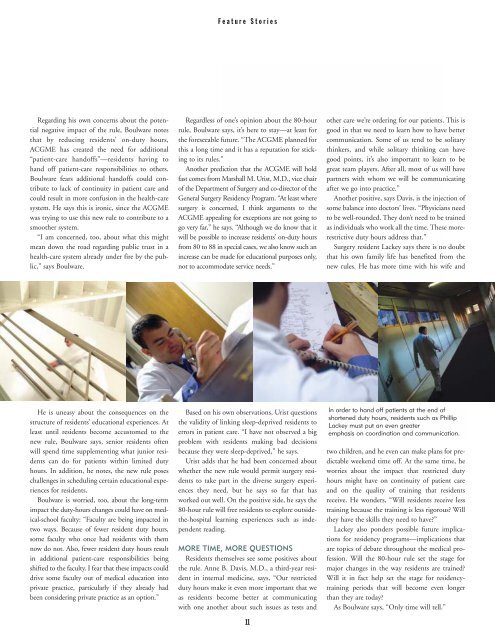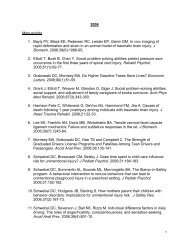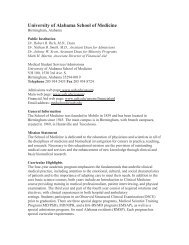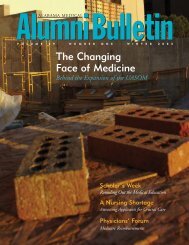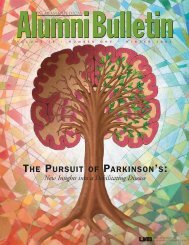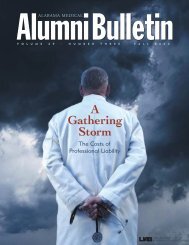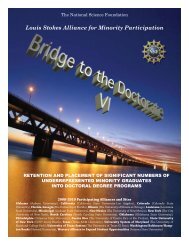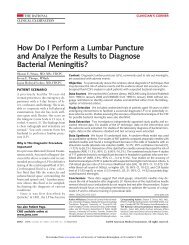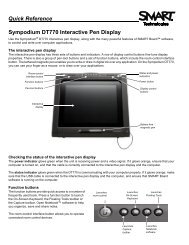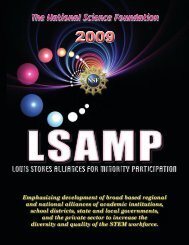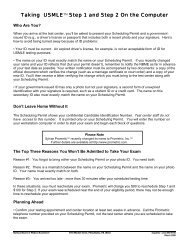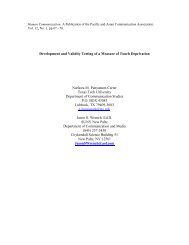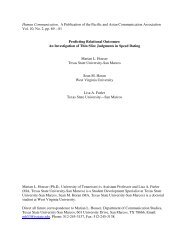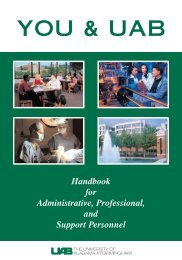uasom doctors uasom doctors - University of Alabama at Birmingham
uasom doctors uasom doctors - University of Alabama at Birmingham
uasom doctors uasom doctors - University of Alabama at Birmingham
You also want an ePaper? Increase the reach of your titles
YUMPU automatically turns print PDFs into web optimized ePapers that Google loves.
Fe<strong>at</strong>ure Stories<br />
Regarding his own concerns about the potential<br />
neg<strong>at</strong>ive impact <strong>of</strong> the rule, Boulware notes<br />
th<strong>at</strong> by reducing residents’ on-duty hours,<br />
ACGME has cre<strong>at</strong>ed the need for additional<br />
“p<strong>at</strong>ient-care hand<strong>of</strong>fs”—residents having to<br />
hand <strong>of</strong>f p<strong>at</strong>ient-care responsibilities to others.<br />
Boulware fears additional hand<strong>of</strong>fs could contribute<br />
to lack <strong>of</strong> continuity in p<strong>at</strong>ient care and<br />
could result in more confusion in the health-care<br />
system. He says this is ironic, since the ACGME<br />
was trying to use this new rule to contribute to a<br />
smoother system.<br />
“I am concerned, too, about wh<strong>at</strong> this might<br />
mean down the road regarding public trust in a<br />
health-care system already under fire by the public,”<br />
says Boulware.<br />
Regardless <strong>of</strong> one’s opinion about the 80-hour<br />
rule, Boulware says, it’s here to stay—<strong>at</strong> least for<br />
the foreseeable future. “The ACGME planned for<br />
this a long time and it has a reput<strong>at</strong>ion for sticking<br />
to its rules.”<br />
Another prediction th<strong>at</strong> the ACGME will hold<br />
fast comes from Marshall M. Urist, M.D., vice chair<br />
<strong>of</strong> the Department <strong>of</strong> Surgery and co-director <strong>of</strong> the<br />
General Surgery Residency Program. “At least where<br />
surgery is concerned, I think arguments to the<br />
ACGME appealing for exceptions are not going to<br />
go very far,” he says. “Although we do know th<strong>at</strong> it<br />
will be possible to increase residents’ on-duty hours<br />
from 80 to 88 in special cases, we also know such an<br />
increase can be made for educ<strong>at</strong>ional purposes only,<br />
not to accommod<strong>at</strong>e service needs.”<br />
other care we’re ordering for our p<strong>at</strong>ients. This is<br />
good in th<strong>at</strong> we need to learn how to have better<br />
communic<strong>at</strong>ion. Some <strong>of</strong> us tend to be solitary<br />
thinkers, and while solitary thinking can have<br />
good points, it’s also important to learn to be<br />
gre<strong>at</strong> team players. After all, most <strong>of</strong> us will have<br />
partners with whom we will be communic<strong>at</strong>ing<br />
after we go into practice.”<br />
Another positive, says Davis, is the injection <strong>of</strong><br />
some balance into <strong>doctors</strong>’ lives. “Physicians need<br />
to be well-rounded. They don’t need to be trained<br />
as individuals who work all the time. These morerestrictive<br />
duty hours address th<strong>at</strong>.”<br />
Surgery resident Lackey says there is no doubt<br />
th<strong>at</strong> his own family life has benefited from the<br />
new rules. He has more time with his wife and<br />
He is uneasy about the consequences on the<br />
structure <strong>of</strong> residents’ educ<strong>at</strong>ional experiences. At<br />
least until residents become accustomed to the<br />
new rule, Boulware says, senior residents <strong>of</strong>ten<br />
will spend time supplementing wh<strong>at</strong> junior residents<br />
can do for p<strong>at</strong>ients within limited duty<br />
hours. In addition, he notes, the new rule poses<br />
challenges in scheduling certain educ<strong>at</strong>ional experiences<br />
for residents.<br />
Boulware is worried, too, about the long-term<br />
impact the duty-hours changes could have on medical-school<br />
faculty: “Faculty are being impacted in<br />
two ways. Because <strong>of</strong> fewer resident duty hours,<br />
some faculty who once had residents with them<br />
now do not. Also, fewer resident duty hours result<br />
in additional p<strong>at</strong>ient-care responsibilities being<br />
shifted to the faculty. I fear th<strong>at</strong> these impacts could<br />
drive some faculty out <strong>of</strong> medical educ<strong>at</strong>ion into<br />
priv<strong>at</strong>e practice, particularly if they already had<br />
been considering priv<strong>at</strong>e practice as an option.”<br />
Based on his own observ<strong>at</strong>ions, Urist questions<br />
the validity <strong>of</strong> linking sleep-deprived residents to<br />
errors in p<strong>at</strong>ient care. “I have not observed a big<br />
problem with residents making bad decisions<br />
because they were sleep-deprived,” he says.<br />
Urist adds th<strong>at</strong> he had been concerned about<br />
whether the new rule would permit surgery residents<br />
to take part in the diverse surgery experiences<br />
they need, but he says so far th<strong>at</strong> has<br />
worked out well. On the positive side, he says the<br />
80-hour rule will free residents to explore outsidethe-hospital<br />
learning experiences such as independent<br />
reading.<br />
MORE TIME, MORE QUESTIONS<br />
Residents themselves see some positives about<br />
the rule. Anne B. Davis, M.D., a third-year resident<br />
in internal medicine, says, “Our restricted<br />
duty hours make it even more important th<strong>at</strong> we<br />
as residents become better <strong>at</strong> communic<strong>at</strong>ing<br />
with one another about such issues as tests and<br />
11<br />
In order to hand <strong>of</strong>f p<strong>at</strong>ients <strong>at</strong> the end <strong>of</strong><br />
shortened duty hours, residents such as Phillip<br />
Lackey must put an even gre<strong>at</strong>er<br />
emphasis on coordin<strong>at</strong>ion and communic<strong>at</strong>ion.<br />
two children, and he even can make plans for predictable<br />
weekend time <strong>of</strong>f. At the same time, he<br />
worries about the impact th<strong>at</strong> restricted duty<br />
hours might have on continuity <strong>of</strong> p<strong>at</strong>ient care<br />
and on the quality <strong>of</strong> training th<strong>at</strong> residents<br />
receive. He wonders, “Will residents receive less<br />
training because the training is less rigorous? Will<br />
they have the skills they need to have?”<br />
Lackey also ponders possible future implic<strong>at</strong>ions<br />
for residency programs—implic<strong>at</strong>ions th<strong>at</strong><br />
are topics <strong>of</strong> deb<strong>at</strong>e throughout the medical pr<strong>of</strong>ession.<br />
Will the 80-hour rule set the stage for<br />
major changes in the way residents are trained?<br />
Will it in fact help set the stage for residencytraining<br />
periods th<strong>at</strong> will become even longer<br />
than they are today?<br />
As Boulware says, “Only time will tell.”


